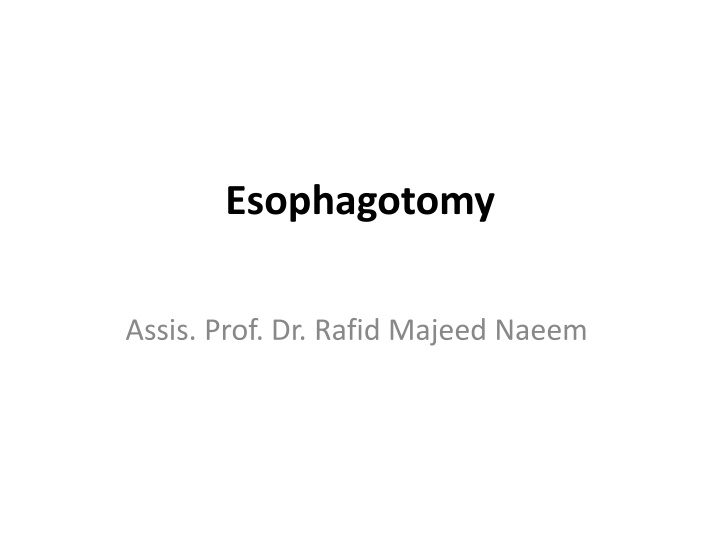
Esophagotomy Procedure: Indications, Surgical Steps, and Post-Operative Care
Learn about esophagotomy, a surgical procedure used to remove foreign bodies or treat esophageal diverticula in animals. This detailed guide covers indications, surgical techniques, blood vessels involved, and post-operative care protocols.
Download Presentation

Please find below an Image/Link to download the presentation.
The content on the website is provided AS IS for your information and personal use only. It may not be sold, licensed, or shared on other websites without obtaining consent from the author. If you encounter any issues during the download, it is possible that the publisher has removed the file from their server.
You are allowed to download the files provided on this website for personal or commercial use, subject to the condition that they are used lawfully. All files are the property of their respective owners.
The content on the website is provided AS IS for your information and personal use only. It may not be sold, licensed, or shared on other websites without obtaining consent from the author.
E N D
Presentation Transcript
Esophagotomy Assis. Prof. Dr. Rafid Majeed Naeem
Indication 1. foreign bodies (potatoes, turnips ect) in horses and cattle lodged in the cervical part of the esophagus .in dogs and cats bones are lodged in the cervical and thoracic parts of the esophagus. 2. esophageal diverticula's.
operation procedure the operation is performed from the midline of the neck or from the site of the foreign body in dorsal recumbent position under general anesthesia
blood vessels of the esophagus cervical portion: cranial and caudal thyroid arteries and esophageal branch of carotids thoracic portion: bronchesophageal artery ventral portion: left gastric artery
Surgical procedure the site of operation clipped , shaved , and disinfected a ventral cervical midline incision. Extend the incision from the larynx to the sternum as needed to allow adequate exposure. Separate the sternohyoid muscles along their midline and retract them laterally
Surgical procedure incision is continued through the cutaneous muscles and blunt dissection is used until reach to the trachea the esophagus is recognized by stomach tube , it is pale reddish color
Surgical procedure the esophagus is opened longitudinally to allow the remove of the foreign body without tearing the wall ,the foreign body is removed by rough thumb forceps
Surgical procedure the wound of the esophageal wall is sutured as the following patterns A- mucosa is suture alone with cat gut 3-0 usp with a simple interrupted pattern and the knot should be inside the lumen. B- muscular layer of the esophagus is sutured with interrupted or continuous suture pattern with non absorbable suture material the muscles is sutured with simple continuous pattern with catgut
Surgical procedure the operation area should be flushed with solution containing broad spectrum antibiotics the skin is sutured by simple interrupted pattern
the structures you found in esophagostomy skin cutaneous muscles sternohyoid muscles vagus nerve carotid artery recurrent nerve trachea esophagus
post operative care systemic antibiotics (ceftriaxone): 22mg /kg body weight for 3 days post operatively keep the animal on fluid therapy at least 4 days and then soft fluid are given to the animal and semi sold food in the thirds week and forth week
complications: constricting scar at the site of incision esophageal fistula hemorrhage infection Incision dehiscence
